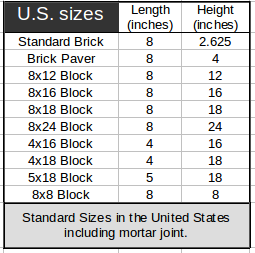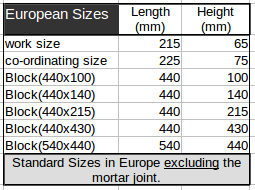The Blocks Needed for a Foundation calculator computes the number of blocks needed for the walls of a foundation.
INSTRUCTIONS: Choose units and enter the following:
- (L) Foundation Length.
- (W) Foundation Width
- (H) Foundation Height
- (BS) Block Size (Choose One)
Blocks Needed (nB): The calculator returns the total number of blocks needed for the foundation, and the approximate amount of concrete needed for the mortar joints.
To compute the amount of concrete needed for a poured foundation, CLICK HERE.
The Math / Science
The Blocks Needed for a Foundation calculator assumes that the foundation wall is one block deep. The user identifies the dimensions of the foundation in height and length and width (see diagram) and chooses the types of block from the pull down list.
To provide the number of blocks, vCalc calculates the area of the walls and then uses the standard dimensions of the blocks to estimate how many blocks are needed for the construction of the walls. The standard dimensions of the blocks take into account the mortar joint. This calculator provides a conservatively high estimate for the number of blocks and assumes that no partial blocks can be reused to complete the foundation.
This is an ESTIMATION, and actual number of bricks or blocks needed may vary based on the thickness of the mortar joints and other factors.
Standard block Sizes
(Width, Height, Length) in inches.
(2,4,7),(2,8,16),(4,8,16),(4,8,12),(4,4,16),(6,8,16),(8,4,16),(8,8,8),(8,8,16),(10,8,16),(12,4,16),(12,8,8),(12,8,16)
Foundations - Footers - Piers
- Blocks in a Foundation: Computes the number of blocks needed for a foundation based on the dimensions of the foundation and the size of the blocks with a standard size mortar joint.
- Concrete in a Poured Foundation
: Computes the volume of concrete, the square feet of the forms and the number of 4'x8's needed for the forms.
- Concrete in a Wall: Computes the volume of concrete in a wall based on the dimensions.
- Concrete in a Footer: Computes the volume of concrete for a footer based on the length, width and depth of the footer.
- Concrete in a Footer (Cross Section): Computes the volume of concrete for a footer based on the length and cross-section area of a footer
- Concrete in a Pier: Computes the volume of concrete in a circular pier based on the radius and depth of the pier.
- Piers for a Building: Computes the number of piers and volume of concrete need for the piers of a building (e.g., pole barn) base on the building dimensions, pier spacing, diameter and depth.
- Concrete around Circular Post: Computes the volume of concrete around a number of round posts in a round hole based on the size of the hole and dimensions of the post.
- Concrete around Square Post:
Computes the volume of concrete around a number of square post (e.g., 6x6) in round hole based on the dimensions of the post, depth and width of the round hole.
- Water Needed for Concrete: Computes the water volume needed to mix concrete.
- Price of Bulk Concrete: Computes the price of bulk concrete including delivery based on mileage and on-site pumping cost.
Masonry Wall Calculators (Brick, Block, Mortar Joints)
Bricks or Blocks for a Wall: Computes the number of bricks or blocks needed for a wall based on the wall's dimensions and the size of the bricks or block.
- Brick Block Wall Cost: Computes the number of brick or block needed for a wall based on the wall dimensions and the brick or block size, and then applies a cost per unit to the number to estimate the total cost of bricks or blocks.
- Mortar Requirement for Wall: Computes the amount of mortar for a wall based on the dimensions of the wall and the size of the brick or block used.
- Bricks for a House: Estimates the number of bricks needed for a four walled structure (e.g., house) based on the building dimensions, the size of the bricks or blocks and the square footage dedicated to doors and windows.
- Cost of Bricks for a House: Estimates the number of bricks for a four walled structure and applies a unit price per brick or block to estimate the total cost.
- Block for a Foundation: Computes the number of blocks needed for the walls of a foundation based on the dimensions of the foundation and the size of the blocks.
- Cost of Blocks for a Foundation: Estimates the number of block for the wall of a foundation based on the dimensions of the foundation and the size of the blocks, and then applies the unit price per block to provide cost estimate.
- Mortar Needed for Foundation: Estimates the amount of mortar needed for the cinder block walls of a foundation based on the dimensions of the walls, size of blocks, and thickness of the mortar joint.
- Bricks per Row:
 Computes the number of bricks in a row based on the length of the row, the size of the bricks and the width of the mortar joint.
Computes the number of bricks in a row based on the length of the row, the size of the bricks and the width of the mortar joint. - Bricks High: Computes the number of rows of bricks to achieve a height based on the height and the size of the bricks.
- Custom Stone in a Wall: Computes the number of masonry units (stone, block or stone) in a wall based on the dimensions of the wall and the dimensions of the units and the thickness of the mortar joints. It also returns the number of rows needed and the number of stone per row.
- Concrete, Rebar and Forms for Wall:
 Computes the volume of concrete, amount of rebar and the surface area of forms for a concrete wall.
Computes the volume of concrete, amount of rebar and the surface area of forms for a concrete wall. - Price of Delivered Concrete: Computes the price of delivered concrete based on the volume, price per cubic yard, pumping cost, delivery distance, and mileage.
- Water Needed for Concrete: Compute the amount of water needed to make a volume of concrete.
- Concrete Mix: Computes volume and weight of cement, sand, gravel and water requires to make a volume of concrete.
